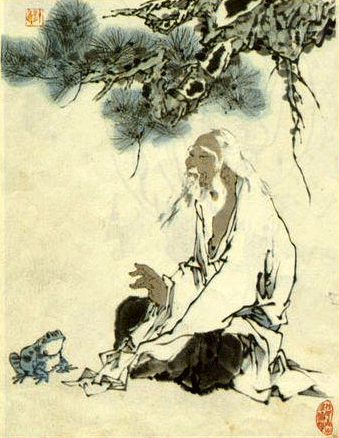
Many early Daoists, like for example the influential Laozi and Zhuangzi, were extremely critical of political authority and advised rulers that the less controlling they were, the more stable and effective their rule would be. I find the early Daoists' case for anarchism extremely compelling. They sought after the harmonious nature of spontaneous order, the Dao, and internalized it into a tremendously rich personal philosophy of life.
I’d like to share some thoughts of Zhuangzi (around 369-286 BC) on the natural disposition of man here which clearly depict his anarchist thought:
Horses live on dry land, eat grass and drink water. When pleased, they rub their necks together. When angry, they turn round and kick up their heels at each other. Thus far only do their natural dispositions carry them. But bridled and bitted, with a plate of metal on their foreheads, they learn to cast vicious looks, to turn the head to bite, to resist, to get the bit out of the mouth or the bridle into it. And thus their natures become depraved.
As with horses, so it is with human beings. Left to themselves they live in natural harmony and spontaneous order. But when they are coerced and ruled, their natures become vicious. It follows that princes and rulers should not coerce their people into obeying artificial laws, but should leave them to follow their natural dispositions. To attempt to govern people from top-to-bottom with manmade laws and regulations is absurd and impossible. We might
as well try to wade through the sea, to hew a passage through a river, or make a mosquito fly away with a mountain!
In reality, the natural conditions of our existence require no artificial aids. People left to themselves will follow peaceful and productive activities and live in harmony with each other and nature. They can, if left alone, create their own ways of life, and create legal systems with which they can cooperate and live peacefully together without a ruler.
In an essay ‘On Letting Alone’, Zhuangzi already asserted the fundamental proposition of anarchist thought:
There has been such a thing as letting mankind alone; there has never been such a thing as governing mankind. Letting alone springs from fear lest men’s natural dispositions be perverted and their virtue left aside. But if their natural dispositions be not perverted nor their virtue laid aside, what room is there left for government?
I am planning to do more posts on Daoism in the near future and explain its philosophy in greater detail. Stay tuned for more...
Awesome as always, @chhaylin
I love Zhuangzi (I have a tattoo of him as a butterfly on my ribs) and his metaphor of the horse. I agree that it is external conditions that cause us to turn against each other, the recent riot here in VA being a prime example. If we were left alone to live in, with, and through Nature, these divisions wouldn't exist.
Downvoting a post can decrease pending rewards and make it less visible. Common reasons:
Submit
@chhaylin AMAZING!!!!!!!!!
Downvoting a post can decrease pending rewards and make it less visible. Common reasons:
Submit
This is why I love the Daoist philosophy. I'm not a very good daoist as I often try too hard. However, I do try to flow more.
Thanks for going in this direction. Eventually, I'll probably also make a post of similar idea with other quotes from them. There really are so many that are anarchistic in nature that it would be hard for anyone to deny it.
Downvoting a post can decrease pending rewards and make it less visible. Common reasons:
Submit
Thank goodness you've worked your way through those silly Westerners.
I'm interested in seeing your methodology here. ;-)
I had read a few things on this topic when I was younger. I have a feeling they may take on new meaning due to my viewpoint on things being slightly different now.
Downvoting a post can decrease pending rewards and make it less visible. Common reasons:
Submit
This is where I can align with you philosophically although I am still at kind odds with you when it comes to your binary stance on postmodernism which is really only trying to point out that there is a little bit of subject in every object and vice versa, at least that is how I see it...........
Downvoting a post can decrease pending rewards and make it less visible. Common reasons:
Submit
In nature there is order and because of that, control is not a necessity. Goverments try to impose order through control
Downvoting a post can decrease pending rewards and make it less visible. Common reasons:
Submit
Wow! What's a good number? 1000 blog? :D Daoism is embedded with the Chinese community in almost every where.
Downvoting a post can decrease pending rewards and make it less visible. Common reasons:
Submit
Question, do you consider Daoism pre-modern mysticism?
Downvoting a post can decrease pending rewards and make it less visible. Common reasons:
Submit